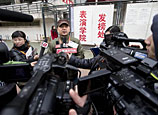
Beijing has launched a new drive to unionize workers at service-sector multinationals, starting with the Big Four accounting firms as it seeks to exert more control over these major overseas employers.
The move would follow the similar unionization of workers at most foreign-owned manufacturers over the last decade, presumably to better protect the rights of Chinese workers.
If providing such protection is really the objective, then this kind of unionization drive looks like a positive development. But the move also looks suspiciously like an attempt to re-create a structure commonly seen at State-run enterprises (SOEs), where an internal Communist Party secretary is usually one of the chief decision makers and politics is often a key element in many major decisions.
The insertion of this kind of government influence into major overseas service-sector companies could create serious disruptions at many of these firms, forcing them to make politically motivated decisions that don't necessarily make good business sense.
Local media reported late last week that China plans to start its white-collar unionization drive in the Shanghai offices of the Big Four global accounting firms, PriceWaterhouseCoopers, Deloitte Touche Tohmatsu, Ernst & Young and KPMG. Observers say these mainland-based unions differ from their Western counterparts, giving the Communist Party and local government more influence within the company in addition to a more traditional role of improving communication between workers and management.
This unionization drive comes less than a year after Beijing made the bold announcement that local Chinese were inadequately represented among top management in the Big Four accounting firms' China operations. At that time, the Ministry of Finance (MOF) ordered the Big Four to raise the number of Chinese partners at their China operations to at least 60 percent of their total.
It further stated the number must reach 80 percent by 2017, and added that all senior partners must eventually be Chinese.
This new unionization drive appears to be an extension of last year's MOF order, aimed at inserting Beijing's arm into these companies that collectively employ some 40,000 people in the mainland.
The fact that these firms still employ so many foreigners, especially in senior positions, is certainly one that needs to be changed over the long run, and most senior foreign managers will say that promoting more local Chinese to high positions is one of their top goals. But those same foreign managers will also add that finding qualified local Chinese to fill top positions is often quite difficult, the legacy of a Chinese modernization that only began to cultivate local Western-style managers two decades ago.
The vast majority of China's most experienced senior managers now work in large SOEs, where the corporate culture is far different from big multinationals and many top executives are regularly shuffled from company to company in a process that many Westerners find baffling. If Beijing tries to forcefully insert these kinds of managers or younger inexperienced people into the top ranks of big multinationals, it runs the very real risk of creating turmoil in the companies by bringing in a dangerous political element to their otherwise commercial operations.
The author is a former company news reporter from Reuters. He writes about China's company news at www.youngchinabiz.com.
















 Farmers in E China's Fujian prepare for spring sowing
Farmers in E China's Fujian prepare for spring sowing


![]()
